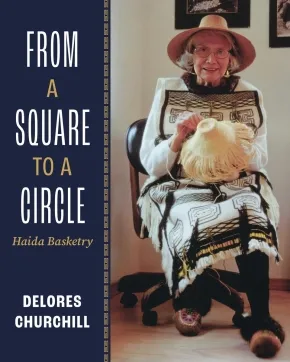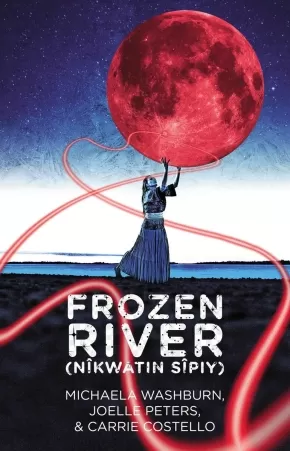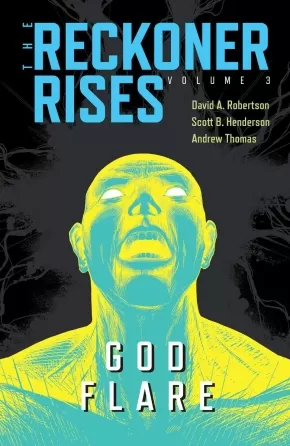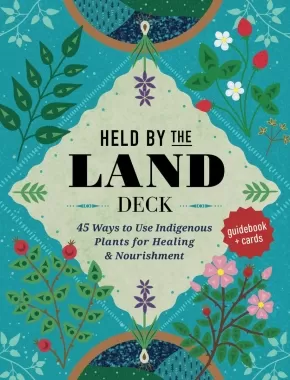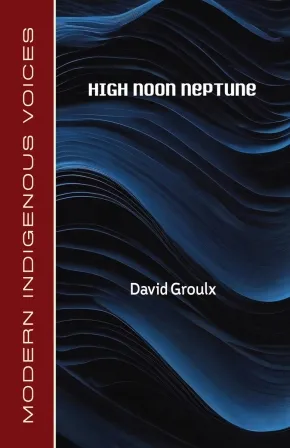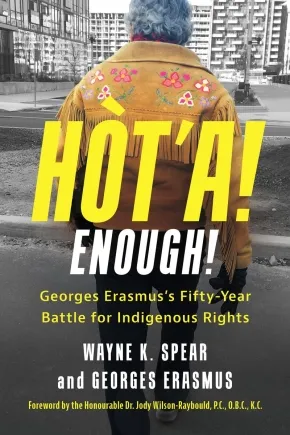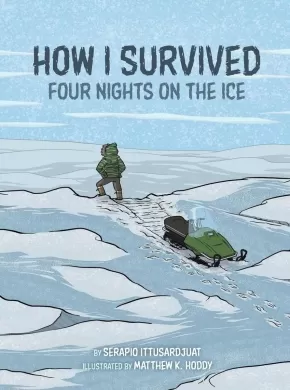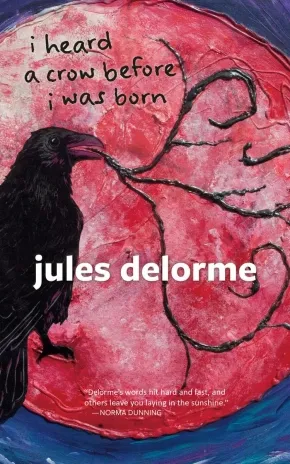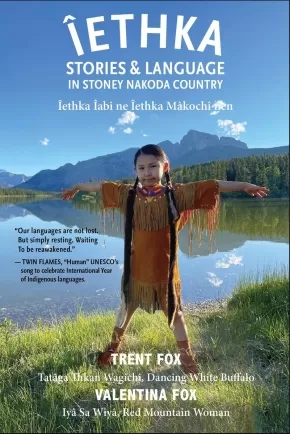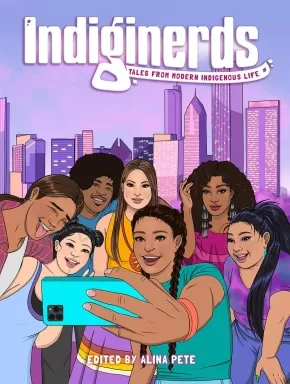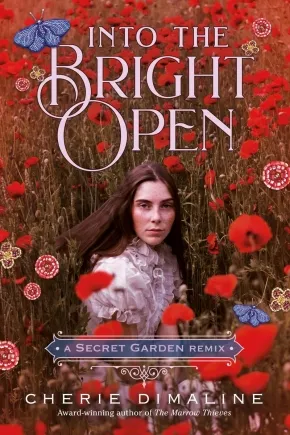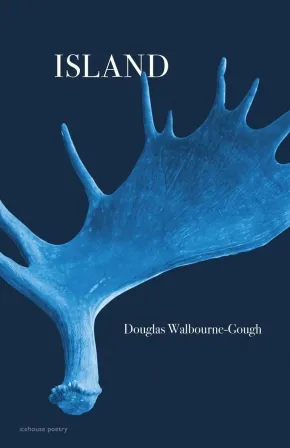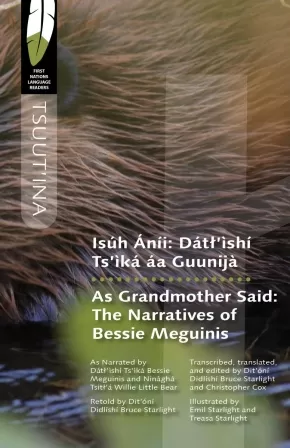
Indigenous Peoples in Canada
91
-
105
of
883 Results;
Sort By
Go To
of 59
From a Square to a Circle: Haida Basketry - Delores Churchill's Memories of Learning to Weave
$34.95
Format:
Paperback
Text Content Territories:
Indigenous Canadian; First Nations; Haida;
Reading Level: N/A
ISBN / Barcode: 9781990776854
Synopsis:
Synopsis:
Delores Churchill, Haida weaver, shares the stories of her life, her culture and the importance of passing cultural knowledge from one generation to the next. Told with humility, humour and deep respect, From a Square to a Circle is a testament to the values of her people, a technical guide to her masterful weaving skills and a gift to the reader at every point along her journey.
Part memoir, part how-to guide, this book shines light on Delores’s weaving teachers, including her strong-minded mother Selina (Ilst’ayaa), whose teachings Delores once resisted as a child. The Haida are connected to weaving through their history, which goes back thousands of years ago as shown through discoveries like the 4,000-year-old baskets at south Baranof.
Walk with Delores as she harvests cedar bark for baskets, Selina teaching “by modelling and then leaving the learner to imitate.” Learn the weaving harvest and preparation terminology. Follow the steps of how to prepare cedar bark, harvest spruce roots, and learn natural dye recipes. Photos and diagrams are visual aids that accompany the steps to Haida weaving techniques and instructions.
Having passed her skills on to hundreds of people, believing that “weaving belongs to all of us,” Delores wishes to share the knowledge of basketweaving where beginners and skilled weavers are able to express their distinct selves, just as every coastal Indigenous weaving style is unique. The love for basketweaving displayed in Delores’s writing is sure to make readers yearn to try their own hand at the craft.
Additional Information
256 pages | 8.00" x 10.00" | 240 Photographs | Paperback
Frozen River (nîkwatin sîpiy)
$18.95
Format:
Paperback
Text Content Territories:
Indigenous Canadian; First Nations; Anishinaabeg; Ojibway; Cree (Nehiyawak); Métis;
ISBN / Barcode: 9780369104892
Synopsis:
Synopsis:
Exploring reconciliation and connection through a story that spans seven generations, Frozen River (nîkwatin sîpiy) tells the story of two eleven-year-olds through the eyes of Grandmother Moon. Eilidh and Wâpam are born under the same blood moon, but Eilidh was born in Scotland and Wâpam in Kihci-Manito kâ ayapit, now known as Manitoba. After sailing across the ocean in hopes of a more prosperous life, Eilidh meets Wâpam deep in the forest, and the two become instant friends. Coming from vastly different worlds, Eilidh and Wâpam decide to teach each other about their ways of life. But when a sacred promise between them is broken, the relationship among cultures becomes jeopardized for generations to come.
Frozen River (nîkwatin sîpiy) shows audiences that an openness to learn from those who have protected and honoured the waterways for centuries can lead to healing and reconciliation.
Awards
- 2021 Sharon Enkin Plays for Young People Award winner
Reviews
"The show’s script cleverly makes important issues digestible for young audiences."— Van City Vince
Educator Information
Recommended for ages 8 to 14.
Additional Information
88 pages | 5.37" x 8.38" | Paperback
Funeral Songs for Dying Girls (PB)
$14.99
Format:
Paperback
Text Content Territories:
Indigenous Canadian;
ISBN / Barcode: 9780735265653
Synopsis:
Synopsis:
After inadvertently starting rumors of a haunted cemetery, a teen befriends a ghost in this brand-new young adult novel exploring grief and belonging by the critically acclaimed and bestselling author of The Marrow Thieves series.
Winifred has lived in the apartment above the cemetery office with her father, who works in the crematorium all her life, close to her mother's grave. With her sixteenth birthday only days away, Winifred has settled into a lazy summer schedule, lugging her obese Chihuahua around the grounds in a squeaky red wagon to visit the neglected gravesides and nursing a serious crush on her best friend, Jack.
Her habit of wandering the graveyard at all hours has started a rumor that Winterson Cemetery might be haunted. It’s welcome news since the crematorium is on the verge of closure and her father’s job being outsourced. Now that the ghost tours have started, Winifred just might be able to save her father’s job and the only home she’s ever known, not to mention being able to stay close to where her mother is buried. All she has to do is get help from her con-artist cousin to keep up the rouse and somehow manage to stop her father from believing his wife has returned from the grave. But when Phil, an actual ghost of a teen girl who lived and died in the ravine next to the cemetery, starts showing up, Winifred begins to question everything she believes about life, love and death. Especially love.
Awards
- 2023 White Pine Award
- 2024 The Crime Writers of Canada Awards of Excellence - Best Juvenile or YA Crime Book
Reviews
"Winifred is an engaging lead with an emotional and fulfilling journey. Artfully melding horror, deadpan humor, and an impossible romance, this well-crafted narrative from Dimaline follows lived-in characters who are tortured by grief. Atmospheric, intimate, and melodic; the rich storytelling sings." —STARRED REVIEW, Kirkus Reviews
"[A] story of healing. Dimaline has created a rich world of complex characters with a narrative that oscillates from love story to suspense-thriller — sometimes within the same chapter — without any tonal whiplash. Funeral Songs for Dying Girls is a complex exploration of grief, family, and love that will appeal to teens and adults alike." —STARRED REVIEW, Quill & Quire
"Contemplative prose excels in its portrayal of a reclusive protagonist longing for connection and overcoming grief while living in a neighborhood that shuns her for perceived shortcomings, presenting a textured narrative about loss and love." —Publishers Weekly
"This lyrical ghost story portrays how a bond between two girls — one living, one not — transforms the grief that roots them both in place. . . . Wrenching and poignant, Funeral Songs for Dying Girls is a haunting tale about what it means to search for home — not the place, but the feeling you carry with you." —BookPage
"Dimaline’s intense, bittersweet, and often funny novel is more than a ghost story. Extended portions about the life and death of Phil, a sympathetically rendered ghost character who becomes one of Winifred’s first loves, allude to the real-life neglected epidemic of MMIWG2S (Missing and Murdered Indigenous Women, Girls, and Two-Spirit People). Through this novel, Dimaline honors those lost." —The Horn Book
"With beautiful, biting prose, Dimaline’s tale of loss and love will challenge its readers to consider how the past can haunt the present if we let it." —CM: Canadian Review of Materials
"Winifred’s narration is startling in its honesty . . . and the result is a deep intimacy that is warm but melancholy." —Bulletin of the Center for Children's Books
Educator Information
Recommended for ages 14+
Additional Information
280 pages | 5.56" x 8.31" | Paperback
Fur Trade Nation: An Ojibwe's Graphic History
$42.16
Format:
Hardcover
ISBN / Barcode: 9781962910002
Synopsis:
Synopsis:
We clothed the royals. We fed the worker. We guided the traveler. We abetted the soldier. We are not afraid to love. So begins Carl Gawboy's groundbreaking graphic history of the Fur Trade Era. From 1650 to 1850, the Ojibwe Nation was the epicenter of the first global trading network. Trade goods from Africa, Asia, Europe, and South America flowed into the Great Lakes region, floating along Ojibwe waterways in birchbark canoes paddled by mixed-race Voyageurs. Gawboy offers a fresh perspective on the fur trade era, placing Ojibwe technology, kinship systems, cultural paradigms, and women at the heart of this remarkable era, where they have always belonged.
Additional Information
202 pages | 8.25" x 11.00" | Hardcover
God Flare
$23.00
Artists:
Format:
Paperback
Text Content Territories:
Indigenous Canadian;
ISBN / Barcode: 9781774920442
Synopsis:
Synopsis:
Eva and Cole are back just in time to face Mihko’s latest threat: the terrifying results of human experimentation.
Cole and Eva are reunited once more. A new terror looms as Mihko Laboratories latest human experiments are about to be unleashed. Cole is on the long road to recovery, but he’s still struggling with survivor’s guilt. He must stay focused as he, Eva, and their friends prepare for the final showdown with Mihko.
After the events of Version Control, Brady’s mind is fractured, and he can’t distinguish between what really happened and what Mikho made him believe. Eva and Cole may have to face this terrifying threat without him. It’s a grim prospect, but a new discovery might just change everything: God Flare.
Will Brady recover enough to join the fight? Can Cole come to terms with his abilities in spite of his PTSD? And will God Flare help even the odds against Mihko?
Reviews
The art style is realistic and gritty, reflecting the serious and dystopian tone of the story. Colors are dark and muted, actions are clear, and special effects of the supernatural pop off the page, a marked contrast to more normal backgrounds and objects.” — Youth Services Book Review
Educator & Series Information
Recommended for grades 8 to 12.
This book is part of the graphic novel series, The Reckoner Rises, a continuation of The Reckoner trilogy. It is Book 3 in the series.
Additional Information
72 pages | 6.50" x 10.00" | Paperback
Held by the Land Deck: 45 Ways to Use Indigenous Plants for Healings & Nourishment - Guidebook + Cards
$25.99
Format:
Paperback
Text Content Territories:
Indigenous Canadian; First Nations; Salish; Coast Salish; Squamish;
Reading Level: N/A
ISBN / Barcode: 9781577154440
Synopsis:
Synopsis:
Have Indigenous plant knowledge at your fingertips with this gorgeously illustrated card deck from Leigh Joseph, an ethnobotanist and a member of the Squamish Nation.
Plants can be a great source of healing as well as nourishment, and the practice of growing and harvesting from trees, flowering herbs, and other plants is a powerful way to become more connected to the land. The Indigenous Peoples of North America have long traditions of using native plants as medicine as well as for food. Held by the Land Deck includes 45 cards of indigenous plants and their properties and a 48-page booklet to guide you along the way. Here are some of the things you will find:
- Tips to build your own home apothecary
- Notes on how to mindfully harvest and connect to the land you’re on
- Recipes for infused oils and salves
- A botanical glossary to help out with some of the more technical language
- Checklists for safe and sustainable harvesting
This beautifully illustrated card deck includes plants that are culturally significant to the Pacific Northwest, including Western Red Cedar, Devil’s Club, Broad-Leaved Plantain, Camas, Wapato, and Red Laver. Special features in the booklet include recipes for food and beauty products along with stories and traditions around the plants.
This elegant, full-color card deck and booklet is your go-to guide for Indigenous plants and will give you new insights into the power of everyday nature.
Additional Information
48 pages | 4.50" x 5.90" | 45 Cards and 48-Page Booklet
High Noon Neptune
$19.95
Format:
Paperback
Reading Level: N/A
ISBN / Barcode: 9781772312225
Synopsis:
Synopsis:
High Noon Neptune is a powerful poetry collection that delves into important issues of loss, love, class, and capitalism. Throughout this book, the reader is taken on a journey of survival, where the intersections of identity and oppression are explored with clarity and reverence. The poems shed light on the complexities of living in a society that is rife with discrimination and inequality, and the battles that individuals face to survive within these intersecting systems. This book fearlessly navigates through societal and personal struggles with a sharp wit and bold defiance. With each poem, David Groulx confronts and challenges the societal norms and structures that perpetuate injustice and inequality. High Noon Neptune offers a raw and unapologetic perspective on the realities of navigating life as a marginalized individual. This poetry collection is a powerful testament to the resilience and strength of those who refuse to be silenced and continue to fight for survival.
Educator & Series Information
This book is part of the Modern Indigenous Voices series.
Additional Information
88 pages | 5.50" x 8.50" | Paperback
Hòt'a! Enough!: Georges Erasmus's Fifty-Year Battle for Indigenous Rights
$28.99
Format:
Paperback
Text Content Territories:
Indigenous Canadian; First Nations; Dene;
Reading Level: N/A
ISBN / Barcode: 9781459752900
Synopsis:
Synopsis:
The political life of Dene leader Georges Erasmus - a radical Native rights crusader widely regarded as one of the most important Indigenous leaders of the past fifty years.
For decades, Georges Erasmus led the fight for Indigenous rights. From the Berger Inquiry to the Canadian constitutional talks to the Oka Crisis, Georges was a significant figure in Canada's political landscape. In the 1990s, he led the Royal Commission on Aboriginal Peoples and afterward was chair and president of the Aboriginal Healing Foundation, around the time that Canada's residential school system became an ongoing frontpage story.
Georges's five-decade battle for Indigenous rights took him around the world and saw him sitting across the table from prime ministers and premiers. In the 1980s, when Georges was the National Chief of the Assembly of First Nations, he was referred to as the "Thirteenth Premier." This book tells the personal story of his life as a leading Indigenous figure, taking the reader inside some of Canada's biggest crises and challenges.
Awards
- 2025 Indigenous Voices Awards - Prose in English Award
Additional Information
320 pages | 6.00" x 9.00" | 57 b&w illustrations | Paperback
How I Survived: Four Nights on the Ice (PB)
$18.95
Artists:
Format:
Paperback
Text Content Territories:
Indigenous Canadian; Inuit;
ISBN / Barcode: 9781772274264
Synopsis:
Synopsis:
After his snowmobile breaks down halfway across the sea ice on a trip back from a fishing camp, Serapio Ittusardjuat recounts the traditional skills and knowledge he leaned on to stay alive.
This harrowing first-person account of four nights spent on the open sea ice—with few supplies and no water—shows young readers the determination and strength necessary to survive in the harsh Arctic climate, even when the worst occurs.
Awards
- 2022 Forest of Reading—Silver Birch Express Award
Reviews
"[T]he graphic novel How I Survived is a true story of Arctic survival written by Serapio Ittusardjuat, an Inuk stone carver and former mechanic.... This beautifully designed, highly engaging graphic novel should engross both reluctant readers and those seeking adventure." - Quill & Quire
Educator Information
Recommended for ages 12+
The original hardcover version was included in the Indigenous Books for Schools 2020/2021 resource list as being useful for grades 6 to 9 for English Language Arts and Social Studies.
Additional Information
48 pages | 7.25" x 9.75"
i heard a crow before i was born
$22.95
Format:
Paperback
Reading Level: N/A
ISBN / Barcode: 9781773104089
Synopsis:
Synopsis:
i heard a crow before i was born.
i heard tsó:ka’we before i was born.
i heard a crow before i was born opens with a dream-memory that transforms into a stark, poetic reflection on the generational trauma faced by many Indigenous families. Jules Delorme was born to resentful and abusive parents, in a world in which he never felt he belonged. Yet, buoyed by the love shown to him by his tóta (grandmother) and his many animal protectors, Delorme gained the strength to reckon with his brutal childhood and create this transformative and evocative memoir.
Across chapters that tell of his troubled relationships, Delorme unwraps the pain at the centre of his own story: the residential schools and the aftershocks that continue to reverberate.
In this stunning testament to the power of storytelling — to help us grieve and help us survive — Delorme tells the story of his spirit walk as he embraces the contradictions of his identity. As he writes, “i heard a crow before i was born is a man looking back, and dreaming back, and seeing that life, in whatever form it takes, however harsh it might seem, is beautiful.”
Reviews
“Jules Delorme is an unconventional storyteller and writer. His exploration of self through the eyes of being ‘half white on the reserve and half Indian in the city’ speaks to his vast experience as a Kanien’kehá:ka man in Canada. Jules has lived and continues to live the life of a man who has leapt over every hurdle that life places in front of him. To be able to write of his life in the way that he has shows his determination. Thank you, Jules, for taking us all on your spirit walk.” — Norma Dunning, award-winning author of Tainna, July 2024
“Sometimes difficult, always honest, i heard a crow before i was born takes us on a journey of trauma, and then healing. Told in a storytelling style, Delorme’s is a tale of survival.” — Drew Hayden Taylor, author of Motorcycles & Sweetgrass, July 2024
Additional Information
164 pages | 5.00" x 8.00" | Paperback
Îethka: Stories & Language in Stoney Nakoda Country
$37.50
Format:
Paperback
Text Content Territories:
Indigenous Canadian; First Nations; Stoney-Nakoda (Nakota);
ISBN / Barcode: 9781990735455
Synopsis:
Synopsis:
This book features the Stoney Nakoda First Nation language in context and in action. The book contains a collection of stories by Trent and Valentina Fox, with each teaching culminating in a learning section. To assist in nuances of the language, the book also includes audio components as web links. The Îethka Stoney Nakoda People are an integral part of the Treaty 7 group of Indigenous Nations in Southern Alberta. Their spoken language is part of the Dakota-Sioux linguistic group.
Educator Information
Recommended for ages 14 to 18.
Additional Information
144 pages | 6.00" x 9.00" | Paperback
Indiginerds: Tales from Modern Indigenous Life
$30.50
Artists:
Format:
Paperback
Text Content Territories:
Indigenous Canadian;
ISBN / Barcode: 9781638991335
Synopsis:
Synopsis:
First Nations culture is living, vibrant, and evolving, and generations of Indigenous kids have grown up with pop culture creeping inexorably into our lives. From gaming to social media, pirate radio to garage bands, Star Trek to D&D, and missed connections at the pow wow, Indigenous culture is so much more than how it’s usually portrayed. Indiginerds is here to celebrate those stories!
Featuring an all-Indigenous creative team, Indiginerds is an exhilarating anthology collecting 11 stories about Indigenous people balancing traditional ways of knowing with modern pop culture. Includes work by Alina Pete, PJ Underwood, Kameron White, Rhael McGregory, and many more.
Educator Information
Recommended for ages 12 to 18.
Full Creator Listing: Tate Allen, Ida Aronson, Jordanna George, Raven John, Nipinet Landsem, Rhael McGregor, Sam “Mushki” Medlock, Alina Pete, Wren Rios, PJ Underwood, Kameron White
Additional Information
120 pages | 6.62" x 10.25" | Paperback
Into the Bright Open: A Secret Garden Remix (PB)
$16.99
Format:
Paperback
Text Content Territories:
Indigenous Canadian; Métis;
ISBN / Barcode: 9781250842640
Synopsis:
Synopsis:
In the Remixed Classics series, authors from marginalized backgrounds reinterpret classic works through their own cultural lens to subvert the overwhelming cishet, white, and male canon. This queer YA reimagining of The Secret Garden subverts the cishet and white status quo of the original in a tale of family secrets wonderful and horrifying.
Mary Lennox didn’t think about death until the day it knocked politely on her bedroom door and invited itself in. When a terrible accident leaves her orphaned at fifteen, she is sent to the wilderness of the Georgian Bay to live with an uncle she's never met.
At first the impassive, calculating girl believes this new manor will be just like the one she left in Toronto: cold, isolating, and anything but cheerful, where staff is treated as staff and never like family. But as she slowly allows her heart to open like the first blooms of spring, Mary comes to find that this strange place and its strange people—most of whom are Indigenous—may be what she can finally call home.
Then one night Mary discovers Olive, her cousin who has been hidden away in an attic room for years due to a "nervous condition." The girls become fast friends, and Mary wonders why this big-hearted girl is being kept out of sight and fed medicine that only makes her feel sicker. When Olive's domineering stepmother returns to the manor, it soon becomes clear that something sinister is going on.
With the help of a charming, intoxicatingly vivacious Metis girl named Sophie, Mary begins digging further into family secrets both wonderful and horrifying to figure out how to free Olive. And some of the answers may lie within the walls of a hidden, overgrown and long-forgotten garden the girls stumble upon while wandering the wilds...
Reviews
"Racism, colonization, and a love of nature are central themes gracefully woven into the story. An aching and emotionally immersive queer romance, unhampered by homophobia, unfolds through lush imagery blended with poignant and elegant prose. A rich and verdant revival of a classic." —Kirkus Reviews, starred review
Educator & Series Information
This book is recommended for ages 13 to 18.
This book is part of the Remixed Classics series.
Additional Information
304 pages | 5.52" x 8.24" | Paperback
Island
$22.00
Format:
Paperback
Text Content Territories:
Indigenous Canadian; First Nations; Mi'kmaq (Mi'gmaq);
Reading Level: N/A
ISBN / Barcode: 9781773103396
Synopsis:
Synopsis:
“Canada rejected our applications for enrolment in the Qalipu First Nation. Initially, I was relieved by the rejection. I’d watched my hometown divide itself — are you Mi′kmaq or settler? Mi′kmaq or not Mi′kmaq enough?”
Centred around the Newfoundland Mi'kmaq experience in the wake of the controversial Qalipu First Nation enrolment process, Island wades through the fracture and mistrust that continues to linger in many communities. In this new collection, Douglas Walbourne-Gough expands upon issues of identity and history that he introduced in Crow Gulch, offering a deeply personal and equally beautiful exploration of Mi'kmaw and Newfoundland identity.
Walbourne-Gough’s narrative poems trace the formation of identity, not through status documentation, but through its deeper roots in childhood memories, family, spirituality, and dreams. Throughout this collection, he approaches life in fragments — snuggling into his nan’s sealskin snowsuit, learning Mi'kmaq from an app, or the myriad of complex emotions that come with receiving a status card — and watches them transform into pieces of an everlasting puzzle. Island reckons with an often-ignored, yet persistent, effect of colonialism — fractured identities.
Additional Information
80 pages | 5.50" x 8.50" | Paperback
Isúh Áníi / As Grandmother Said: Dátl'ìshí Ts'ìká áa Guunijà / The Narratives of Bessie Meguinis
$24.95
Format:
Paperback
Text Content Territories:
Indigenous Canadian; First Nations; Dene; Tsuut’ina (Tsuu T'ina, Sarcee);
Grade Levels: 12; University/College;
ISBN / Barcode: 9780889779853
Synopsis:
Synopsis:
The first book published in Tsuut’ina—a critically endangered language—in over a century!
With fewer than 150 speakers, Tsuut’ina is a critically endangered language. Isúh Áníi / As Grandmother Said brings together nine traditional narratives and historical accounts in the Tsuut’ina language, originally narrated by Elders Dátł’ìshí Ts’ìká Bessie Meguinis (1883–1987) and Ninàghá Tsìtł’á Willie Little Bear (1912–1989). At once an act of language preservation and a learning resource, each story is retold in Tsuut’ina by Dit’óní Didlíshí Dr. Bruce Starlight and is presented with English translations and a Tsuut’ina-to-English glossary.
The narratives included in this collection cover considerable ground, ranging from the creation of the world in the caring hands of Xàlítsa-tsii and his animal helpers, to accounts of separation, migration, and cross-cultural contact that mark major turning points in Tsuut’ina history, and to important cultural and ceremonial items and practices that the Tsuut’ina Nation maintains to this day.
These stories will be of lasting value to Tsuut’ina language learners and teachers, and will share the legacy of Elders Bessie Meguinis and Willie Little Bear with generations of Tsuut’ina to come.
Educator & Series Information
This book is part of the First Nation Language Readers series. With a mix of traditional and new stories, each First Nations Language Reader introduces an Indigenous language and demonstrates how each language is used today.
Additional Information
186 pages | 5.50" x 8.50" | Paperback
Sort By
Go To
of 59

